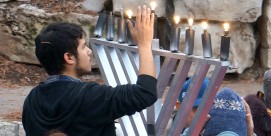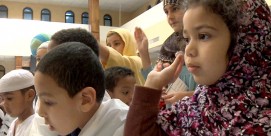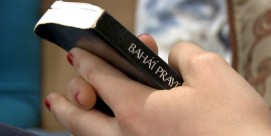RABBI DAVID PASKIN (Kehillah Schechter Academy): I think about Thanksgiving one of the, the holidays in the Jewish calendar that reminds me of bounty is actually the holiday of Sukkot which came just about a month ago. And what’s interesting about Hanukkah, and forgive me for the history lesson, is that Hanukkah is actually Sukkot postponed. So the Hasmoneans were engaged with this war with the Syrian Greeks and when it was time to celebrate Sukkot they couldn’t. They were too busy. And so finally after the temple was cleaned and re-purified then they celebrated Sukkot, an eight-day holiday, and that became Hanukkah. So there’s this wonderful sort of triangulation of Thanksgiving, Hanukkah and Sukkot, Sukkot being a celebration of bounty and harvest which gave birth to Hanukkah and which now coincides with Thanksgiving.
Hanukkah’s been so closely linked with, with Christmas, which by the way, should not come as a surprise. In the darkest time of the year we’re all yearning and searching for light and so Christmas is a holiday of light, Hanukkah a holiday of light, Kwanza a holiday of light. So I think that sometimes we get uncomfortable with the proximity or the, or the relationship that Hanukkah and Christmas have, have have built together, and certainly they’re very different messages and Christmas is a far more important holiday than Hanukkah, but I think again, even there we can find core messages, messages of light, bringing light into a dark world.
For non-Jews and Jews alike an important message that Thanksgiving and Hanukkah can give us is that there are different ways that we can approach the struggle for religious freedom. For the pilgrims it was to leave their homeland. It was to go to a land that they didn’t know and to leave everything behind. And we, we sort of think about this brave journey, this courageous journey that they made. I think we sometimes forget about how difficult it must have been for them to leave their entire lives behind, their families. For the Hasmoneans in the time of the Maccabees, it was to fight back against a ruling and brutal authority that was suppressing them. And yet for others today in America, we don’t leave our homes, we don’t fight back but we are still engaged in that struggle. And so I think that perhaps for non-Jews and Jews is to look at the breadth of responses that we’ve had throughout time, to the struggle for religious freedom, and what is that struggle gonna look like for the next generation? How are we gonna teach our children what it means to honor and to respect different cultures and different traditions. Will we give them the tools, the habits of mind, the skills, to be able to navigate those waters, to be able to stand up in the face of struggle, in the face of anti-Semitism, in the face of religious suppression? Will they have the courage to stand their ground, to leave home if they need to, to fight back?
For Jews there’s this custom that we should say 100 blessings a day. The rabbis teach us that we should say 100 blessings a day. We say a blessing every time we eat, we say a blessing when we get a new piece of clothing, we say a blessing when we see a rainbow, we say a blessing when we see a king or a queen or a president. There’s a blessing for everything, and for a Jew to stop at every given moment and to just be thankful, to acknowledge that we’re blessed, that’s something that’s so core to who we are. So we do have holidays that celebrate thankfulness. Of course Hanukkah’s one of them but so much more than any one holiday it is a part of who we are, it’s a part of what it means to be a Jew, to live a thankful life.
Thanksgivukkah can be a spark that allows us to bring a little bit of the Hanukkah light into a Jewish person’s Thanksgiving table, then that...that’s a gift.
The challenge is what happens after that spark is ignited? Are we able to nurture that spark? That’s something that we take really seriously here at the school that every child has a spark and our job, and Thanksgivukkah’s a tiny, tiny piece of that, is to nurture that spark and to help it grow. That’s the real work of engaging people in religious life.
For whatever reason, thanksgiving has never been a big part of my own practice. I think maybe it’s because I’m a vegetarian and tofurkey just isn’t as satisfying as a real turkey maybe. But as I think about this year, I want Thanksgiving to be a more meaningful part of my family’s life. Because we’re Jews and because Thanksgiving is such an important part of who we are, we’re constantly talking with our children, three daughters, about what they’re thankful for. It’s an important part of our lives. But I think that this year on Thanksgiving, on Thanksgivukkah, we’re also gonna be bringing the story of the pilgrims to our table, and we’re gonna be renewing our connection to how blessed we are to be in this country, at this time in history. That’s something that I’ve never really celebrated to the extent that I think I will this year and so I’m very thankful to Thanksgivukkah for that.







